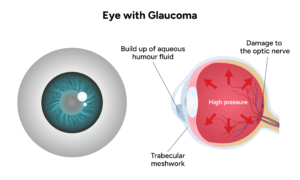
Primary Open-Angle Glaucoma
This is the most common type of glaucoma in the United States. It develops slowly over time as the eye’s drainage system becomes less effective, causing a gradual increase in intraocular pressure. There are typically no early symptoms (no pain or noticeable vision changes), which is why many patients don’t realize they have it until permanent vision loss has already occurred. Regular eye exams are the only reliable way to detect it early.
Angle-Closure Glaucoma
Unlike open-angle glaucoma, angle-closure glaucoma occurs when the drainage angle of the eye suddenly becomes blocked. This causes a rapid increase in eye pressure and is considered a medical emergency. Symptoms may include severe eye pain, nausea, blurred vision, and halos around lights. Quick treatment is essential to prevent permanent vision loss.
Normal-Tension Glaucoma
Some people develop optic nerve damage and vision loss even though their eye pressure remains within the normal range. This type of glaucoma (called normal-tension or low-tension glaucoma) may be related to poor blood flow to the optic nerve. Because the pressure appears normal, it can only be identified with a full exam that includes optic nerve imaging and visual field testing.
Secondary Glaucoma
This form of glaucoma is caused by another eye condition or event—such as trauma, inflammation, certain medications (like steroids), or complications from eye surgery. Treatment focuses on both controlling the underlying cause and lowering eye pressure to protect the optic nerve.
Congenital Glaucoma
Although rare, some children are born with a defect in the eye’s drainage system, leading to glaucoma early in life. Signs may include cloudy corneas, enlarged eyes, or excessive tearing. Early diagnosis and surgical treatment are critical to preserving vision.
Trusted Diagnosis and Care in Ocala
Because glaucoma can take many forms, accurate diagnosis is essential. Dr. Croley and his team use advanced imaging, pressure testing, and visual field assessments to detect even the earliest signs of optic nerve damage.
If you haven’t had a recent eye exam, or you have a family history of glaucoma, schedule an appointment at Central Florida Eye Institute by contacting (352) 237-8400.




